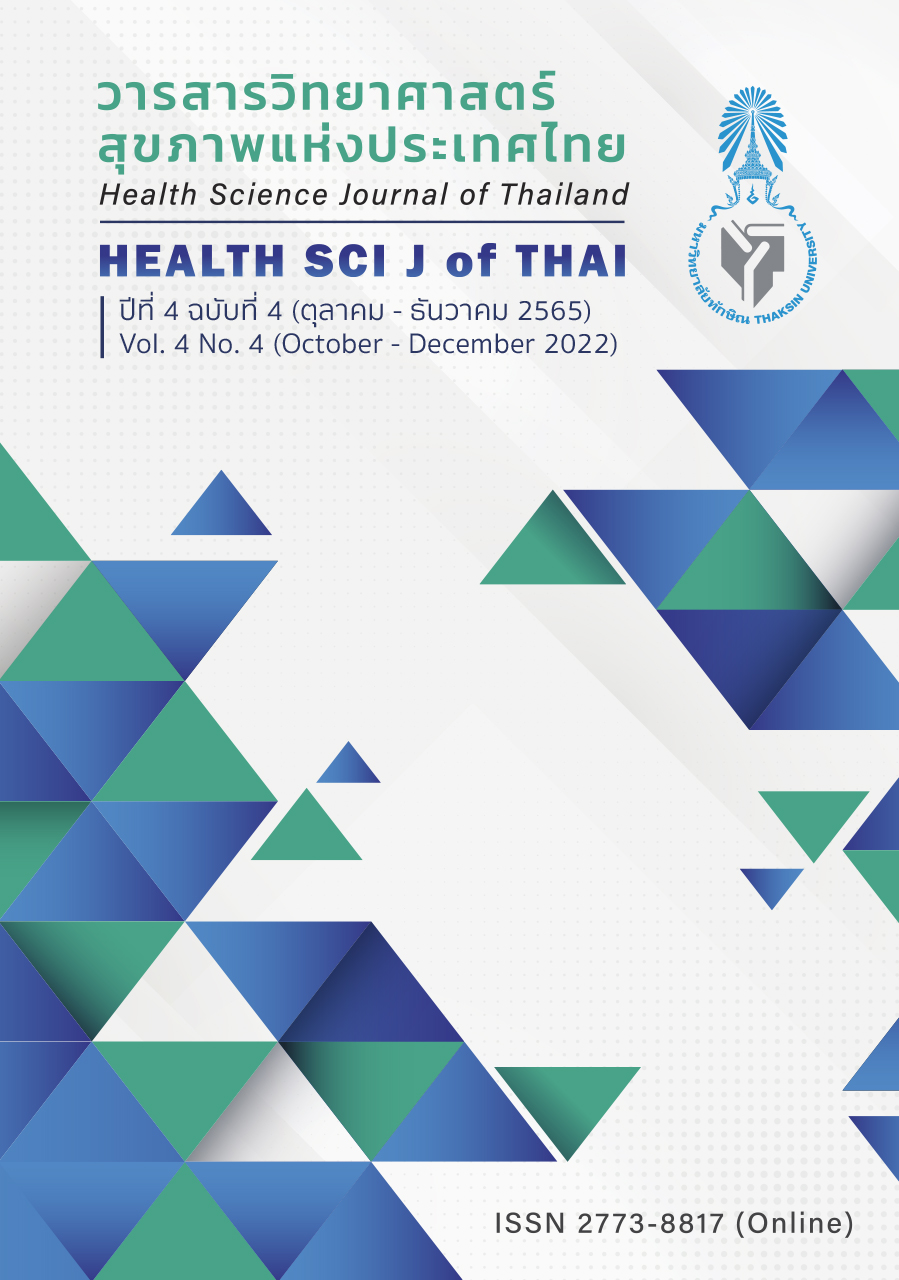Process of Preparation for Aging by Community in Northeast
Main Article Content
Abstract
This critical ethnography research aimed to study the process of preparation for aging by the community.
The study was conducted in a sub-district of the northeastern province of Thailand. Data were collected during
July 2020-July 2021. The total number of samples was 142. The samples of 112 key informants were selected
by the purposive sampling method, and 30 general informants were selected by the snowball sampling method.
The data were collected by participatory observation, in-depth interviews, focus group discussions, field notes,
and other sources. The data were statistically analyzed using percentage, proportion, and ethnographic data
analysis. The results showed that the process of preparation for aging by the community consists of 8 creations:
the creation of awareness about learning to be a quality senior citizen, the creation and development
of caregivers, creation of an environment that is ready for entering old age, creation of health and rehabilitation,
creation of safe food, creation of sustainability for the community economy, creation of welfare, and creation
of a mechanism to drive ageing preparation by the community. In summary, the study reflects the
collaboration of the four parties in driving the process of preparing for the elderly, which is linked to
multidimensional preparation together with the dimensions of society, culture, economy, environment, health,
politics, and governance to be ready for entering to the old age with quality
Article Details

This work is licensed under a Creative Commons Attribution-NonCommercial-NoDerivatives 4.0 International License.
References
Institute for Population and Social Research Mahidol University, Foundation of Thai gerontology research and development institute. Situation of the Thai elderly 2020. [Internet]. 2020. [Cited in 18 November, 2021]. Available from: https://thaitgri.org/Downloads/ThaiElderly_2563.pdf.
Department of Older Persons, Mistry of Social Development and Human Security. Strategic for Department of Older Persons 2017-2021 (Second edition). Bangkok: Thepphen Vanish Printing; 2020. (In Thai)
National Statistical Office, Ministry of Digital Economy and Society. Active ageing index of Thai elderly. Bangkok: Text and Journal Publication Co. Ltd.; 2019. (In Thai)
World Health Organization. Active ageing a policy framework. [Internet]. 2002. [Cited in 20 November, 2019]. Available from: https://apps.who.int/iris/bitstream/handle/10665/67215/WHO_NMH_NPH_02.8.pdf.
Foundation of Thai gerontology research and development institute. Situation of the elderly 2019. [Internet]. 2019. [Cited in 19 December, 2021]. Available from: https://www.dop.go.th/download/knowledge/th1610945020-322_0.pdf.
Zubair M, Norris M. Perspectives on ageing, later life and ethnicity: ageing research in minority contexts. Ageing & Society 2015; 35: 897-916.
Kornadt AE, Voss P, Fung HH, Hess TM, Rothermund K. Preparation for old age: The role cultural context and future perceptions. Journals of Gerontology: Psychological Sciences 2019, 74(4): 609-619.
National Committee on the Elderly, Mistry of Social Development and Human Security. The 2nd national plan on the elderly 2002-2021. Bangkok: 3 Lada Limited Partnership; 2019. (In Thai)
Meechana P, Khansakorn N, Silawan T, Rawiworrakul T, Phijaisanit P. Readiness of pre-aging population for quality aging society in Nongyasai Sub district, Nongyasal District, Suphanburi Province. EAU Heritage Journal Science and Technology 2017; 11(1): 259-271.
Onthaisong C, Sornkla K, Suebsun S, Promsuan W. The preparation for entering the aging society of the population in Mueang District, Surin Province. Journal of Nursing and Health Care 2020; 38(2): 53-62.
Kotpratum K, Nuntaboot K. Community continuing care for older people: ethnography research. Suranaree Journal of Science and Technology 2018; 25(3): 275-286.
Division of Older Persons Promotion, Department of Older Persons, Mistry of Social Development and Human Security. Add knowledge: Prepare before old age (First edition). Bangkok: Amarin Printing and Publishing Public Co. Ltd.; 2019. (In Thai)
Haene LD. Beyond division: Convergences between postmodern qualitative research and family therapy. Journal of Marital and Family Therapy 2010; 36(1): 1-12.
Freeman M, Vasconcelos EFS. Critical social theory: Core tenets, inherent issues. New directions for Evaluation 2010; 127: 7-19.
Leininger MM. Culture Care Diversity and a Theory of Nursing. Boston: Jones and Barlett; 2006.
Carter M, Fuller C. Symbolic interactionism. Sociopedia.isa 2015; 1: 1-17.
Mary-Ann H, Kim U, Colin H. Carspecken’s Five-Stage Critical Qualitative Research Method: An Application to Nursing Research. Qualitative Health Research 2006; 16(1): 151-161.
Jinda P. Community information system for sustainable development. Journal of Information Science 2010; 28(1): 93-105.
Department of Older Persons, Mistry of Social Development and Human Security. Measures to Implement Nation Agenda on Aged Society 6 Sustainable 4 change (Revised edition). Bangkok: Amarin Printing and Publishing Public Co. Ltd.; 2019. (In Thai)
Pangsiri M, Wanaratwichit C. The preparation for activeaging pre-aging population. Journal of Phrapokklao Nursing College 2020; 31(2): 213-223.
Kitreerawutiwong K, Kitreerawutiwong N. The development direction for long- term care giver in community. Journal of Nursing and Health Care 2018; 36(4): 14-24.
Subwongchroen N, Chintapanyakun T. Role of palliative care nurses in tertiary hospitals. Journal of The Royal Thai Army Nurses 2020; 21(1): 26-34.
Aruma EO. Roles of communication in community development. International Journal of Network and Communication Reserarch 2018; 5(1): 1-10.
Ratchathawan R, Kaewkrajok T, Phromkaew P, Sumdangsan D, Thonglert D. The community participation process in well-being development. Journal of Southern Technology 2018; 11(1): 231-238.


